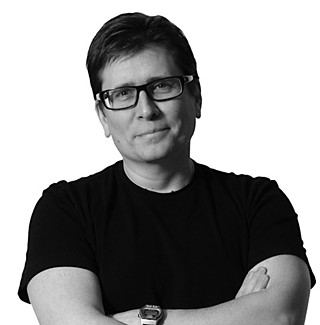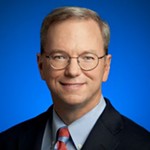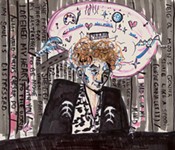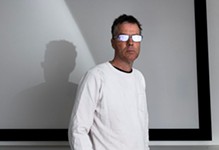Take Two Aspirin and Ping Me in the Morning
Health care: an oral future
By Shawn Badgley, Fri., March 8, 2013
(Page 2 of 3)
Bryan Sivak, Chief Technology Officer, U.S. Department of Health and Human Services: Health care is quite possibly the largest challenge we face in this country, for many, many, many reasons. I've always been sort of interested in it, anyway, because my dad's a doc, his dad's a doc, my uncle's a doc, and I almost became a doc. For the first time, my dad actually understands what I do.
I believe pretty strongly that [the Department of Health and Human Services] has two important assets – maybe the most important assets – when it comes to transforming the state of health and health care in the country. The first one is the people: We have 90,000 employees at the department. You have to keep in mind that HHS is inclusive of the National Institutes of Health, the Food and Drug Administration, the Centers for Disease Control and Prevention, and the Centers for Medicare and Medicaid Services, which is the world's largest insurance company, for lack of a better term. We have the Indian Health Service, which is a fully integrated health system. There's a ton of stuff that we do, but also a ton of unactivated potential.
The other important asset at HHS is this massive amount of data that we have. For decades and decades and decades, we've been collecting or creating or cataloging or curating data, so we have thousands of different data sets, some of which are historic in nature, some of which contain information on national trends, some of which are full of personally identifiable information, like the Medicare claims data set. Some are more useful than others, but the bottom line is that we have a ton of data that, if we make it available in real, machine-readable, systematic, and consistent ways, we believe it will have the power to help activate the potential of the thousands and thousands of entrepreneurs and developers and designers and large companies out there who can do interesting, innovative things. We spend a lot of time focusing on what we call liberating the data.
About two years ago, the Department of Veterans Affairs – which runs a massive integrated health system for veterans in this country – in conjunction with the White House and HHS, put a Blue Button on their website. It allowed any of their members to click and download a copy of their entire health record – the idea being that if you can provide patients with access to their health record, then it would be much easier to provide to other physicians or providers. One of the many neat things about this is the way they did it. Typically in government, when you start a project like that, there'll be years of debate and discussion about requirements and searches for vendors and lots of money spent and time wasted, and it just takes forever. But the approach they took was from the start-up perspective: Let's get something out as quickly as possible based on the needs that we think our user base has, and then iterate rapidly from there to create something that might be more useful. So, the first version of Blue Button was really just a stake in the ground, and over the past couple of years, they've done just that, standardizing the format and giving us all kinds of opportunities to improve the access to this data.
Dana Ragouzeos, Lead Research Designer, Kaiser Permanente: I think it has largely felt counterintuitive for health care stakeholders to embrace social media and sharing information over the Web. And this is for good reason: There is a lot of risk in doing this; privacy and protection are very important in medicine. But I think as organizations have made forays into providing patient-facing online medical records, emailing patients, providing tools for symptom-checking, and providing social media services for its patients, they have largely felt positive benefits. Patients generally appreciate the transparency and increased access this gives them. So, I think in the next few years we will see huge growth in more organizations getting on board with this.
Sarah Worthy, Tendenci community manager at Schipul: We're all overwhelmed by the data, and there's too much of it. One of the main purposes of my panel at South by Southwest is to address the problem of how do you search through all of the information online to find the data that applies to you, and how do you interpret that data. This is a great problem to have, and we will solve it in time. Problems like this create opportunities for innovation, positive change, and growth: both growth for each of us individually, as well as growth for the American health care system. It's an exciting time to be in health care IT.
There's a recent study that came out in January of this year [www.pewinternet.org/Reports/2013/Health-online.aspx] that shows that 81% of Americans go online to research health care topics and 35% go online to try and diagnose their illness before seeking medical treatment. This study isn't the first study that shows people find the Internet to be a trustworthy source of information for health care facts. Ten years ago, people didn't even really trust the Internet for finding a date, and e-commerce sites like Amazon and eBay were still fighting to prove their credibility. Now, people are willing to trust the Internet for their health care.
Jerilyn MacLaren-Hall, senior consultant, Logical Design Solutions: Ultimately, what I strive to deliver are meaningful experiences that span a variety of touch points – including digital ones such as websites, mobile applications, and social media engagement models – but that also span ideas like support networks, planned and unplanned live conversations, and even ambient experiences that a person may not even realize they are engaging with, but yet somehow influences their ideas, beliefs, and, ultimately, behaviors.
I do believe that patients feel more alone in the process, that it is on their shoulders to figure it all out. ... I would say that we have started to use it as a crutch; that the statement "There's an app for that" has become synonymous with "There's a strategy or solution for that," which means there is a huge misunderstanding about the role technology can – versus should – play in health care management.
We have to stop trying to build one rule and design all solutions against that rule. We are all beings influenced by our context, and the role of digital in our lives can change drastically depending on what turns our lives take. What might be too much information for one person may be not even close to enough for another. I think it is more about helping people understand what resources are available to them and how to use those resources to achieve the goals they have, and we have to think about those goals as something much bigger than a given condition. Because no one is a condition: We are simply who we are, [including] feelings, ideas, goals, all trapped in a physical body.
Moss: Taking control of our own health is going to have to be a skill that we all learn. An example: We provided HIV-positive patients at the Boston Medical Center who rarely took their meds with visualizations and disease-stage simulation of how the HIV virus attacks your T4 cells. It actually shows you on your smartphone or your cell phone what happens if you're not taking your meds. And it educates the HIV patient on how HIV progresses to AIDS, and how the drugs in the cocktail prevent that. Before that, it wasn't even believed that patients could understand that. Give them the meds and give them a timer, if you're lucky, or a pillbox, and hope that they do it. But we found that even these HIV patients, many of whom didn't have high school educations and so forth, were becoming very astute, and once they understood their disease and how it worked, and were able to be proactive, were very proud of that. And actually exceeded the expectations of pessimistic or cynical medical professionals. That's just the very beginning of the capabilities of patients given access to the technology.
Ragouzeos: The people that are going to make choices leading them toward wellness are going to do so regardless of social media, access to information, and technology. Same with the people who are going to make choices leading them away from wellness. Social media, etc., give us the tools to support whatever decisions and choices we make. What I've learned from hours of research and observation is that wellness is highly personal, and the most successful changes come from some intrinsic trigger. Yes, technology makes it easier for some to stick with those choices, and yes it opens up tools and services to a larger audience ... but, no, I don't think it has created, or will ever create, a golden age of wellness. The Web is not the Holy Grail for health or wellness. And, this is not a plug, but this is what Meredith [DeZutter, of the Mayo Clinic's Center for Innovation] and I focus on in our South by Southwest session. To optimize technology for our personal and communal health, we need to get back to basics: Support productive communication, informed decision-making, and information transparency. The web will not do this alone, but it can support this.
I have seen people refrain from referencing the Web at all because they either do not have access, do not want information overload, or wholly trust their doctor's advice, so why look elsewhere? I have seen patients with acute illnesses, like cancer, look to the Web obsessively to understand their odds of a cure, their different treatment options, to read through the experiences of others. I have seen people with chronic conditions look to the Web to understand the potential side effects of new treatments, often because this is impossible for their care provider to predict. In both cases, information can range from being extremely comforting to extremely unsettling – and this range of feelings can be experienced in a matter of minutes.
Worthy: Personally, I've used the Internet to research health care issues. When my son was first born, I think I was going online almost daily for some little thing, because it was a quick place for me to get information about whether or not I should call my doctor. This probably won't come as a surprise to my close friends, although this is probably the first public place where I've admitted it, but I suffer from ADHD, OCD, and generalized social anxiety. I was diagnosed when I was 29 years old, after spending over 15 years with misdiagnosis and on different medications for depression and anxiety. The Internet was where I went and finally took control of my mental health care, and I found other case studies and stories from people who had similar symptoms and issues like mine, and I researched what worked for them and what didn't, and I took those examples back to my doctors, who were able to use that information so I could finally get the treatment I needed. Even more importantly, during my research online, I was able to identify with other people suffering the same illness that I had and I found comfort and encouragement knowing I wasn't alone, and there was hope to getting treatment.
Doctors and other health care providers don't have time to do this research for each of their patients. I think these doctors should encourage patients to go online and do research. They can provide patients with reputable online websites and ask the patient to bring back stories and examples that sound similar. This could dramatically improve the diagnosis of some of these more challenging or rare diseases. In the case of mental health care, it's even more of a struggle because of how difficult it is to diagnose a specific medical condition. A patient can present physical and mental symptoms that predict anywhere from two to 10 different possible diagnoses. ADHD and ADD, for example, can look much like bipolar. Women present different symptoms than men do, as was my case and why it took so long for my diagnosis.











